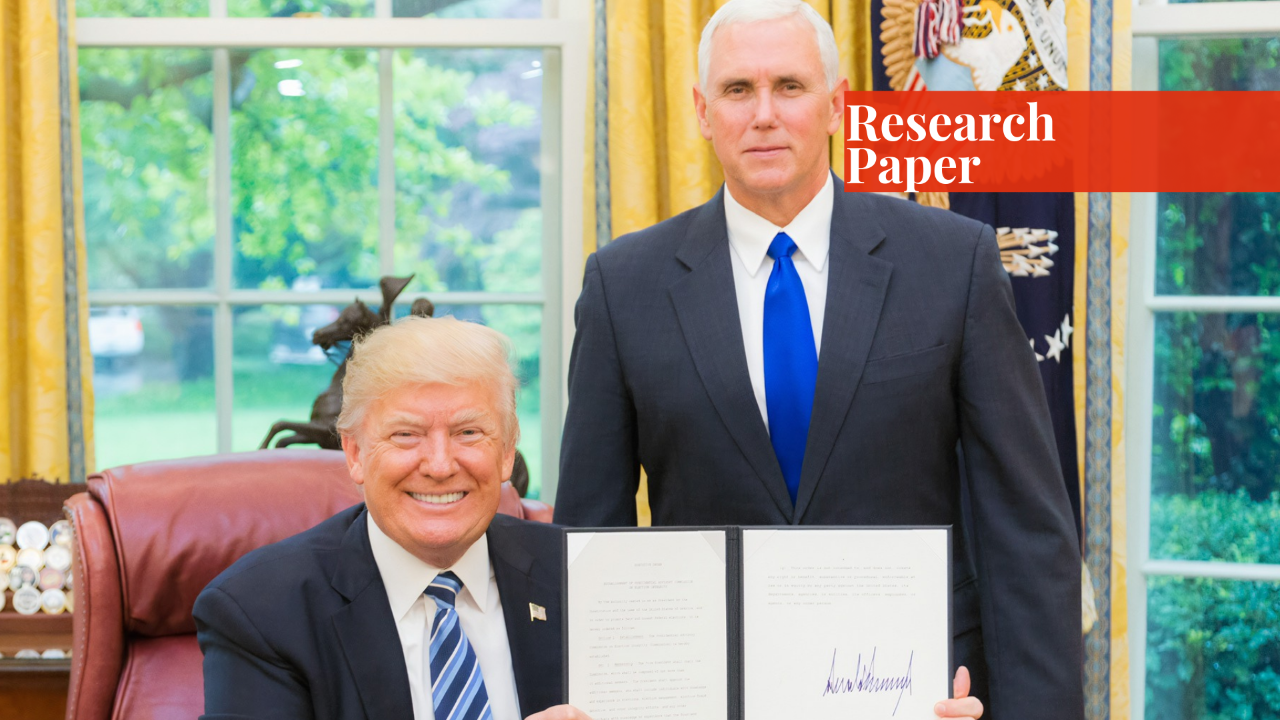Ms Mahnoor Nafees is a student of BS International Relations at the University of Management and Technology.
Introduction
With the dawn of Donald Trump’s presidency, a new era emerged for the Middle Eastern region, more specifically for Palestine and Israel. From shifting the US embassy to Jerusalem and accepting Jerusalem as Israeli capital to the recent signing of the Abraham Accords, the Trump administration has supported and benefited Israel by going to great lengths.
Although the US has supported Israel long before it was even created and throughout its history, President Trump has left no stone unturned to shift the regional balance of power in Israel’s favor. With his anti-Muslim rhetoric, President Trump has followed a maximum pressure campaign not only against Iran but also against other adversaries.
Two Goals in the Middle East: Oil and National Security
The US has multiple goals and insecurities regarding the region due to which it feels the need to strengthen its foothold. First of all, the US wants to consolidate its regional hold to secure its access to huge oil resources of the region. The US has aligned itself with Saudi Arabia which is the largest exporter of oil to the US.
The vast resources and production of oil have provided Saudi Arabia with an edge and the ability to govern oil prices and the oil market. During the 1973 Arab-Israel war, Saudi Arabia stopped its oil exports to America as an answer to American support for Israel (Editors, 2018). America now needs to make sure this doesn’t happen again and for this purpose, it needs to have a regional foothold, which it has in the shape of Israel.
Secondly, to strengthen its foothold in the region and to safeguard its national security, the US needs to take measures against the radical Islamist and proxy groups and their great benefactor, Iran (Moller, 2016).
The US’s National Security
The US security in the region, for the sake of understanding, can be divided into two parts. Firstly, the security of its territory and sovereignty, which was greatly compromised in the case of the 9/11 attacks by the hands of al-Qaeda, a terrorist group. A strong foothold in the region allows the US to take efficient steps to neutralize these threats.
Secondly, the security to its strategic interests which involves its regional dominance and the security of its strategic allies. By supporting Israel economically, militarily, and diplomatically, the US makes sure that Israel remains the strongest state in the region. This has helped the US to keep in check the role of its adversaries like Russia, China, and Iran in the region.
Furthermore, by Israeli involvement in the conflict with regional proxies, the US has had an efficient way to test its new military technologies and ammunition. Most importantly, Israel possesses missiles that can reach the former Soviet Union and thus helps to keep the regional balance of power ultimately in favor of the US (Zunes, 2002).
In addition, it is more affordable for the US to maintain its bases in Israel than in other Arab states (Hamdi, 2018). Lastly, the US holds its traditional rhetoric of promoting democracy and freedom in a region occupied by monarchs. The US acknowledges Israel as the sole democratic country in the region whose security is threatened by its neighboring monarchies. To fulfill its obligations of promoting democracy in the region, it needs a powerful Israel which makes its position in the region strong (Robinson, 2020).
The Israel Lobby
The sections above describe the US’s aims and goals in the Middle Eastern region which makes it necessary for the US to support Israel, but there are other factors that guide US foreign policy towards Israel and its unwavering support to it. These factors include the role of the Israel lobby and the public opinion which includes the majority of Evangelicals and the Jewish community, both of which strongly support Israel (Robinson, 2020).
Mearsheimer and Walt (2007) argue that the Israel lobby is another significant force that shapes the US foreign policy towards the Middle East. Studies have found that though the lobby consists of more Evangelicals than Jews, it strongly supports Israel (Miller, 2014). This owes to the religious beliefs that lead them to support the sustenance of a Jewish state in the region.
Though Jews are skeptical about Christian support for their cause, they nevertheless enjoy the benefit of it. The lobby has exerted pressure as far as deciding how to deal with the Iraq war and Iran’s nuclear programs (McGlinchey, 2010).
History of the US’s Involvement in the Region
The US has proven to be the strongest all-time ally of Israel. From being the first country to officially accept it as a state to becoming the first to shift its embassy to Jerusalem, consolidating Israeli claims of Jerusalem as their capital, the US has never waned in its support of its strongest ally (US Relations with Israel, 2021).
Since the end of the cold war, the US has taken the role of a major player in the middle eastern region. Being the sole superpower, it has tried to take on the role of a neutral arbiter but with little success. The end of WWII and the formation of Israel were two great events that occurred simultaneously.
This divide created a new bipolar world where the competition for dominance was fierce between the two big powers, that is, the US and USSR. This also gave shape to the US’s policies regarding the middle eastern region; the US had to advance soft and accommodating policies to advance its relations with the energy-rich gulf and middle eastern states as well as increase its support of Israel.
For this purpose, it tried to assume the role of a neutral arbiter that would try to go towards a peaceful and plausible solution for both states. In the initial phase, Britain and France with the United States tried to portray a neutral picture by following an arms limitation policy. However, the 1956 Suez Canal crisis which conformed to the personal interest of Britain and France, left the US as the sole administrator of the region.
In the preceding wars of 1967 and 1973, the US put its heavyweight in support of Israel and against the Arab coalition forces. Afterward, President Jimmy Carter was able to initiate a peace deal between Israel and Egypt in 1979, which came to known as the Camp David Accords. President Clinton further advanced the peace process in the Middle East by initiating another peace deal between Israel and Jordan in 1994.
Furthermore, in 1998, President Clinton also arranged for dialogues between the Israeli Prime Minister and Yasser Arafat to address the conflict of occupation of the West Bank (Reuters, 2010). Israel-US relations comparatively saw a bitter era during President Obama’s era.
Due to President Obama’s preference to starting the peace talks again and with a comparatively impartial stance to accommodate Palestinians, Israeli Prime Minister Netanyahu shared a more strained relation with President Obama.
However, even with the willingness and support to start the peace process and talks again, objective decisions and outcomes were not achieved till the end of President Obama’s era in 2016 (Kaufman, 2017).
Analyzing Trump’s Policies
Unscrupulous Appointments
President Trump’s biased and partial approach to future Palestinian demands is proved by his appointment of biased and rigid officials in terms of the Israel-Palestine problem. David M. Friedman, who is known for his strictly harsh rhetoric and biased approach towards the Palestinians, was appointed as the US ambassador to Israel (Rodriguez, 2020).
Being an orthodox Jew, he was increasingly in favor of the Israeli settlements in the West Bank and considered them Israel’s legal rights. More importantly, Friedman did not have any diplomatic experience which further made his appointment suspicious. Another biased appointment President Trump made was to appoint Jason Greenblatt and his son-in-law, Jared Kushner, to devise the Middle East Peace plan which Trump afterward termed the ‘‘deal of the century’’.
Jared Kushner was additionally given the position of advisor to the president. He, like Friedman, had no diplomatic background and was unfit for the job which required an impartial judgment from both sides as he belonged to a Jewish family and was tilted towards advancing Jewish interests (Abdiel, 2020).
Greenblatt, on the other hand, was another member of President Trump’s policy team on the Israel-Palestine issue. He was a lawyer working for the Trump Organization when Trump bestowed him with the position of executive vice president and legal advisor. The role of Mike Pence and Mike Pompeo cannot be left out when naming the architects of US policy towards Israel and Palestine.
Jerusalem is Israel’s Capital in the Eyes of the US
After the appointment of officials in important places, President Trump’s next move was the announcement acknowledging Jerusalem as Israel’s capital on December 6, 2017. It is important to note here that the authority to shift Israel’s capital to another city was given to any sitting president by the Jerusalem Embassy Act of 1995.
However, since then, no President other than Trump has tried to use this, considering the vulnerable peace prospects of the region. President Trump has not only announced to acknowledge Jerusalem as Israel’s capital, but he also ordered the shifting of the US embassy from Tel Aviv to Jerusalem.
The embassy was successfully shifted to Jerusalem on 14 May 2018. The day marked different sentiments for the two sides; on one side, Ivanka Trump, Jared Kushner and other Israeli officials were celebrating the move, while on the other side, 52 Palestinians were killed by Israeli forces, protesting against the movement (Rodriguez, 2020).
Ignoring the Palestinians
In August of 2018, the US administration started cutting off economic aid to Palestine. It also cut off its contributions to UNRWA (United Nations Relief and Works Agency). Being the largest contributor to UNRWA, the cut in economic aid affected the Palestinian population largely which was already facing economic maneuvering and oppression by Israeli organizations.
To further compress the Palestinians, the Trump administration closed the PLO (Palestinian Liberational Organization) diplomatic mission office in Washington. According to the Trump administration, this was done to bring Palestinians back to negotiations, but the coercive acts further acted to worsen the situation and ignited resentment in the already oppressed party.
Furthermore, the US allowed its citizens to sue Palestinians for aggression and violence if they were to attempt any kind of attack on US citizens. In addition, President Trump officially recognized Israel’s occupation of the Golan Heights as legitimate. It was another out-of-the-box move that harbored criticism from the world community as Golan Heights was internationally accepted as a contested region, which legally belonged to Syria and was occupied by Israel during 1967 war (Rodriguez, 2020).
This was another move that differed greatly from the perspectives of the past presidents. It further showcased America’s willingness to support Israel even if it had to go against its traditional narratives of peace and equality, and even if it meant strained relations with its allies.
The Middle East Peace Plan
On 28th January 2020, President Trump with Israeli Prime Minister Benjamin Netanyahu by his side announced his historic ‘‘Middle East Peace Plan’’. President Trump named it the ‘‘deal of the century’’, as according to him this plan was the solution to the decades-old Palestine-Israel conflict and provided an equal and impartial adjustment to the stakeholders.
The plan was unanimously rejected by the Palestinian authorities who rather preferred to call it a ‘‘slap of the century’’ (Jazeera, 2020). The plan was based on some inherent contradictions of the clauses and solutions that it presented. First of all, the peace plan which was aimed at building peace between Palestine and Israel was constructed without taking any of the Palestinian authorities in confidence. The plan was solely designed and put forward by President Trump and Prime Minister Netanyahu’s team.
It did not effectively portray Palestinian demands and was thus naturally biased. Furthermore, the plan did not clearly elaborate its aims. The peace plan included US recognition of Israel’s occupation of the West Bank as legitimate and granted Israel leverage to exercise its power in the West Bank.
Moreover, the plan envisages that Palestine would be given East Jerusalem as its capital, but also mentions that Jerusalem remains the undivided capital of Israel. Palestinian authorities argue that the plan is aimed at stripping them of their demands and only leaves them with 15% of the historic Palestinian land.
The plans are outrightly biased towards Israel as it does not challenge Israel’s settlements in the West Bank and does not provide Palestinians the state they demand and the state which is described in the UN’s two-state solution. Furthermore, it strips Palestinians of their ability to build themselves economically as the plan includes keeping the Palestinian state under armed and in surveillance (BBC, 2020).
These inherent contradictions in the plan and the Trump administration’s increasingly assertive and coercive stance to implement it and call it a peace plan, despite strict Palestinian rejection, explain the biased and tilted foreign policy approach of President Trump and his administration.
The Abraham Accords
Another major event that President Trump calls his victory is the signing of the Abraham Accords. The Abraham Accords which signify the full normalization of relations between an Arab country and Israel holds immense importance for the US, Israel, and the region as well. The accords were signed by Israel and UAE in the presence of Bahrain on 15 September 2020.
The accords portray the very first big and real achievement of the Trump administration as this signifies that the Arab world is now opening up to Israel. This has resulted in decreased isolation of Israel and increased cooperation with regional states in terms of security, economy, and technology.
These accords were not possible without US intervention and pressure on Arab states to normalize relations. The UAE has gotten great benefits in terms of its military might by agreeing to normalization. Although the Palestinians have been betrayed and further isolated, UAE has gotten assurances of getting advanced F-35 fighter jets which were previously only granted to Israel (Guzansky & Marshall, 2020).
The Accords hold importance for the US as it helps it to shift the balance of power in Israel’s favor. The accords will actively align Israel, UAE, Bahrain, and Saudi Arabia against Iran’s aggressive goals. Furthermore, it will provide security assurance to Israel against the existential threat which Iran poses.
The time of announcement of these accords is also highly beneficial for both President Trump and Prime Minister Netanyahu, as both had domestic conditions which they successfully avoided by shifting public attention to the signing of these accords.
President Trump was able to show his first real victory in foreign policy which could prove beneficial for his upcoming elections. On the other hand, Netanyahu faced corruption charges at home and with the event, he got an effective chance to divert public attention.
Withdrawal from the Joint Comprehensive Plan of Action (JCPOA)
President Trump has also removed the US from the Joint Comprehensive Plan of Action (JCPOA), which was a nuclear deal that allowed Iran limited access to the technology. This decision is also highly ‘‘pro-Israel’’ as it benefited Israel by securing its position as the sole powerful state in the region.
A nuclear-armed Iran is against Israeli aims and goals in the region and poses an existential threat to it (Zurcher, 2018). Trump’s policies towards the Palestine-Israel conflict have further distanced the prospects of peace for the volatile region.
His harsh rhetoric against Muslims and hardline pro-Israel policies garnered criticism and condemnation throughout the world. This was a huge blow to the traditional position of the US as a neutral arbiter and the one that promoted freedom, as it did exactly the opposite in this case. The biased policies have made Palestinians more isolated and deprived.
Expectations from Joe Biden
Joe Biden has previously served as the Vice President during President Obama’s era. As per his rhetoric in the election campaign, he vows to reverse the biased and hardline steps taken by President Trump to stabilize the conditions and make both parties return to the negotiation table.
It is, however, presumable that the US would not remove its heavy support from Israel’s backing, since Joe Biden during his visit to Israel in the 1960s said “If there weren’t an Israel, the United States of America would have to invent an Israel to protect her interests in the region” (Alsaafin, 2020).
Israel holds an important strategic position for the US, and thus President Biden would also not go to great lengths to restart the peace process and reverse the major steps taken by Trump such as the normalization with Arab countries.
However, Biden reassured during his election campaign that he would reopen the US consulate, which was closed by Trump, to accommodate Palestinians and would continue the financial and economic assistance that Palestinians received before Trump. Another major point included by Biden is his willingness to revive the JCPOA which the Israeli administration outrightly opposes (Bishara, 2021).
Conclusion
US foreign policy in the era of President Donald Trump witnessed sharp and steep change. From his popular rhetoric of ‘‘America first’’ to the recent normalization deals, Trump has pursued policies that have negatively affected his image and US relations with its European allies. Abdiel (2020) argues that President Trump can be called a ‘‘goal-driven’’ president.
A goal-driven leader endeavors to pursue his/her specific goals, which most of the time relate to personal interests and preferences. Goal-driven leaders care less about the contexts and consequences and pursue their own choices (Abdiel, 2020). President Trump’s biased policies are a result of his own linkage to the Jewish identity and their cause.
He has definitely isolated Palestinians and tainted the US’s long-drawn narratives of peace, democracy, and freedom. President Biden can now revert these policies to America’s maximum benefit, but his policies about this specific conflict are still to be seen.
References
- Abdiel, K. S. (2020). Individual Foreign Policy Analysis of Donald Trump: A Case study of the US Embassy relocation to Jerusalem. Jurnal Hubungan Internasional, 9(1), 15-27. https://journal.umy.ac.id/index.php/jhi/article/download/7943/pdf_21
- Alsaafin, L. (2020, November 8). Joe Biden ‘no saviour’ of the Palestinians. Al Jazeera. https://www.aljazeera.com/news/2020/11/8/joe-biden-no-savior-to-the-palestinians
- Al Jazeera. (2020, January 28). ‘Slap of the century’: Palestinians slam Trump Middle East plan. https://www.aljazeera.com/news/2020/1/28/slap-of-the-century-palestinians-slam-trump-middle-east-plan.
- BBC. (2020, January 28). Trump releases long-awaited Middle East peace plan. https://www.bbc.com/news/world-middle-east-51288218
- Bishara, M. (2021, January 28). Biden to Israel and Palestine, the show must go on. Al Jazeera. https://www.aljazeera.com/opinions/2021/1/28/biden-to-israel-palestine-the-show-must-go-on
- Byman, D., & Moller, S. B. (2016). The United States and the Middle East: Interests, Risks, Costs. In Jeremi Suri and Benjamin Valentino (Eds.), Sustainable Security: Rethinking American National Security Strategy (pp. 263-296). Oxford University Press.
- Council on Foreign Relations. (2018, December 7). U.S.-Saudi Arabia Relations. https://www.cfr.org/backgrounder/us-saudi-arabia-relations
- Guzansky, Y., & Marshall Z. A. (2020). The Abraham Accords: Immediate Significance and Long-Term Implications. Israel Journal of Foreign Affairs, 14(3), 379-389. https://doi.org/10.1080/23739770.2020.1831861
- Hamdi, O. A. (2018). American Foreign Policy toward the Arab-Israeli Conflict: Strategic Transformations. Insight Turkey, 20(2), 251-272. https://www.jstor.org/stable/26390316
- Kaufman, J. P. (2010). A Concise History of U.S. Foreign Policy. Rowman & Littlefield Publishers, Inc.
- Mearsheimer, J. J., & Walt S. M. (2008). The Israel Lobby and U.S. Foreign Policy. Farrar, Straus and Giroux.
- McGlinchey, S. (2010, October 31). Review – The Israel Lobby and U.S. Foreign Policy. E-International Relations. https://www.e-ir.info/2010/10/31/the-israel-lobby-and-u-s-foreign-policy/
- Miller, P. D. (2014). Evangelicals, Israel and US Foreign Policy. Survival, 56(1), 7-26. https://doi.org/10.1080/00396338.2014.882149
- Reuters. (2010, March 15). TIMELINE: U.S.-Israeli relations since 1948. https://www.reuters.com/article/us-palestinians-israel-usa-timeline-idUSTRE62E45Z20100315
- Robinson, K. (2020, April 12). What Is US policy on the Israeli-Palestinian conflict? Council on Foreign Relations. https://www.cfr.org/backgrounder/what-us-policy-israeli-palestinian-conflict
- Rodriguez, M. (2020). The Israeli-Palestinian Conflict in the Trump Era: A Human Rights Perspective. [Bachelor’s thesis, Trinity College]. Trinity College Digital Repository.
- U.S. Department of State. (2021, January 20). U.S. Relations With Israel. https://www.state.gov/u-s-relations-with-israel/
- Zunes, S. (2002, May 1). Why the U.S. Supports Israel. Institute for Policy Studies. https://ips-dc.org/why_the_us_supports_israel/
- Zurcher, A. (2018, May 8). Three reasons behind Trump ditching Iran deal. BBC. https://www.bbc.com/news/world-us-canada-43902372
If you want to submit your articles and/or research papers, please check the Submissions page.
The views and opinions expressed in this article/paper are the author’s own and do not necessarily reflect the editorial position of Paradigm Shift.


















